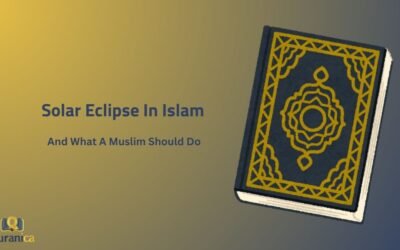Introduction to Quranica’s Feature Film “Solomon and the Queen”
Quranica’s feature film Solomon and the Queen is, first and foremost, a showcase of the beauty of the Qur’an’s message and narrative style, through a masterful recitation by the renowned Egyptian qari, Hajjaj Ramadan al-Hindawi. When we gave him the stage on the last day of his Scotland tour in 2006, we did not tell him what to recite. He recited those verses from Surat al-Naml, and the rest is history.
Editing and Production for Quranica’s Ten-Year Anniversary
When the time came to edit it to coincide with Quranica’s ten-year anniversary and re-launch, it was clear that the beauty of that original event deserved a fresh approach to editing and production. And so the idea to weave in commentary (as well as providing real-time translation, as we had done in most live events) was born.
The Research and Selection Process for Commentary
Here I shall provide some insight into the process of research and selection of opinions. I consulted a large number of works of tafsir, as well as a few which fall outside that genre but discussed, for example, female personalities in the Qur’an (including Bilqis). I knew that what we needed in this film was not a full tafsir, but a simple commentary which would aid reflection. Although I needed to answer all the questions in my own mind, I did not wish to impose those answers on the viewers.
Filling the Gaps in the Story and Understanding the Significance
In the first place, I was intrigued by so many things in this story, and needed to “fill the gaps”, as it were. I wanted to understand why certain things had taken place, and what was the significance of mentioning them in this narrative. One difficulty I found was that tafsirs in general had not taken this approach. Some had indeed filled gaps, but using narrations taken from those who had a tendency to spread tall tales, with no regard for the status of God’s prophets. When these had no inherent credibility and seemed implausible as explanation of the verses, I avoided them altogether and sought alternative explanations.
Translation Choices and Adaptations
As for translation, I took as a basis that published by Saheeh International, which – I understand – was translated primarily by a woman named Umm Muhammad. Its advantage is that it uses quite a direct style of expression which often follows the word- and phrase-order of the Arabic, thus making it suitable for subtitles. However, I adapted this translation in a number of ways, especially to make it match with the interpretations I preferred in the course of researching the exegesis.
Final Translation and Tafsir Issues
In what follows, I present the final translation and allude to some of the issues which arise in the tafsir works, and how I selected from these. I shall also point out the original ideas which came to me in the process.
The Gratitude and Humility of David and Solomon
- We certainly gave David and Solomon knowledge, and they said, “All praise is for God, Who has favoured us over many of His believing servants.” 16. And Solomon inherited David, and he said, “O people, we have been taught the language of birds, and we have been given from all things. Indeed, this is evident bounty.”
The mention of knowledge here suggests that it is one of the key issues in what is to follow. Their gratitude and humility also set the tone for the story. The use of the plural here can certainly be in the royal sense, but I prefer to think that Solomon (pbuh) was saying that when this knowledge was possessed by the leader and used for the benefit of the whole society, then it is a shared knowledge. As such, he was inspiring gratitude in the people.
The Gathering of Solomon’s Soldiers
- And gathered for Solomon were his soldiers among the jinns (spirits), humans and birds, and they were arranged in ranks. 18. Until, when they came upon the valley of the ants, an ant said, “O ants, enter your dwellings, lest you be crushed by Solomon and his soldiers, while they perceive not.”
One of the puzzling aspects of the story is location. Solomon was based in Palestine, and Sheba almost certainly refers to a Yemeni kingdom. Where was this valley, and where were the troops going? Was the palace in Palestine too, in which case they had presumably returned there by the time Solomon requested the throne to be brought? I opted for these conclusions: this was merely a procession of the troops, and the “valley of the ants” is not necessarily the specific one alluded to in the books of exegesis, which goes by that name.
The Discussion About the Ant’s Gender
The exegetes enjoyed discussing the sex of this particular ant. The argument can be made that it was female, based on the feminine word namlatun; but it can also be said that this is simply the way the generic word naml is made singular and has no bearing on its sex. However, modern science informs us that most worker ants – and this would appear to be one – are female. Indeed, it was a great realisation for me that ants live in what I called a “queendom”, just like Sheba! Then the parallels between the two parts of the story suddenly became clear, and this is something I did not find in any of the books.
The Parallels Between the Ant and the Queen of Sheba
It is hugely tempting to suppose that the ant mentioned here was actually their queen, although it seems unlikely, unless she herself was informed by the workers about the impending danger and sounded the alarm to her “subjects”. In this way, the parallels between the two stories would be complete: two queens who wanted nothing but to save their communities from being crushed!
Solomon’s Response and Gratitude to God’s Favor
- So (Solomon) smiled, amused at its speech, and said, “My Lord, enable me to be grateful for Your favour which You have bestowed upon me and upon my parents and to do righteousness of which You approve. And admit me by Your mercy among Your righteous servants.”
A key question here is what made him smile, and I presented the views of the exegetes in my commentary.
Solomon’s Concern Over the Missing Hoopoe
- And he took attendance of the birds and said, “What is with me that I do not see the hoopoe – or is he among the absent?
- I will surely punish him with a severe punishment or slaughter him unless he brings me clear authorization.”
Why was he so severe in his threat against this bird? I presented an explanation found in one or two sources.
The Hoopoe’s Report from Sheba
- But (the hoopoe) tarried not long (and arrived), saying, “I have encompassed (knowledge) which you have not encompassed, and I have come to you from Sheba with certain news.
The Ruler of Sheba and the People’s Worship
- Indeed, I found a woman ruling them, and she has been given of all things, and she has a mighty throne.
- I found her and her people prostrating to the sun instead of God – and Satan has made their deeds pleasing to them and averted them from the Way, so they go not aright –
The Hoopo’s Message and the Divine Truth
- So they do not prostrate to God, Who brings forth what is hidden within the heavens and the earth and knows what you conceal and what you declare –
- God – there is no deity but He, Lord of the Mighty Throne!”
I assumed that the whole passage was from the speech of the hoopoe, though an alternative view has it that everything from “Satan has made their deeds…” could be God’s direct speech in the Qur’an.
King Solomon’s Test of Truthfulness
- (Solomon) said, “We will see whether you were truthful or were of the liars – 28. Take this letter of mine and deliver it to them. Then draw back from them and see how they respond.”
I found at the end of Imam Alusi’s commentary on this story that he expressed surprise that King Solomon could have been so unaware of Sheba, and he had no explanation for this. However, Amin Ahsan Islahi in his Tadabbur-e-Qur’an addressed this question to an extent I did not find elsewhere. He suggested that Sulaiman did in fact know about them, so the hoopoe’s declaration was – on this understanding – somewhat exaggerated. Yet Islahi argues that it would be strange for the King to send such an ultimatum for no purpose but to test the veracity of a bird’s claim!
The Queen of Sheba’s Response to Solomon’s Letter
- (So he delivered it to the Queen, and) she said, “O chiefs, indeed, to me has been delivered a noble letter. 30. Indeed, it is from Solomon, and it (reads): {In the name of God, Most Gracious, Most Merciful – 31. Be not haughty with me but come to me in submission.”
Context of the Word ‘Submission’ in the Story of Solomon and the Queen
The gloss at the beginning here is somewhat necessary because such details are often left out of the Quranic narrative style. Instead, we are transported instantly to the Queen’s court with the word: “She said”.
The word muslimin (“in submission”) and the concept of islam appears in this story at various places. I have taken every occurrence before the final verse to have a worldly sense of submission, not the religious submission to God. However, it is very plausible in this particular verse that Solomon was inviting the people to become Muslims in that full sense.
Queen’s Strategic Approach to Leadership and Power Dynamics
- She said, “O chiefs, advise me in my affair. I would not decide a matter until you attend to me.”
- They said, “We are people possessing strength and great bravery – but the command is yours, so see what you will command.”
- She said, “Indeed kings – when they enter a city, they ruin it and render the nobles among its people lowly – and likewise they (will) do.”
These verses are interesting in terms of the power dynamics. She is in charge, but she is choosing her words carefully to convince her people. They are also alluding to their preferred course of action.
Female Leadership and Controversial Perspectives
It is also interesting to see how this story is used to support various points of view. A scholar of the calibre of Sh. Yusuf al-Qaradawi has advanced this as an example of female leadership of a nation (a level below the global leadership represented in Islamic history in the caliphate). Some have refuted him by saying that she was actually a dictator, so should not be taken as an example! (Not a convincing refutation.) This could be taken as a recommendation of shura and/or democracy, while it has also been pointed out that unbelievers in Quranic stories are not to be followed as role models. Still, the matter is clearly more nuanced than that.
Analyzing the Meaning of “Wa Kadhalika Yaf’alun”
One more question is the meaning of “wa kadhalika yaf’alun” – I opted for the view that it is the completion of the Queen’s speech, and refers to the (conditional) future. Others have taken it to be a divine statement which confirms what she had said, i.e. “She is right: that is what they always do”.
Solomon’s Response to the Queen’s Gift
- “But indeed, I will send to them a gift and see with what (reply) the messengers will return.”
- So when they came to Solomon (bearing the gift) he said, “Would you provide me with wealth? What God has given me is better than what He has given you! Rather, it is you who rejoice in your gift.”
- Return to them, for we will surely come to them with troops that they will be powerless to counter – and we will surely expel them therefrom in humiliation, and they will be debased!”
Different Interpretations of Solomon’s Statement
The phrase “Bal antum bi-hadiyyatikum tafrahun” (end of v. 36) can be taken in three distinct ways:
- “You are simply showing off your wealth by putting this gift before me!”
- “I am not materialistic like you, but you are the ones who rejoice at receiving gifts!”
- “Take this gift back and enjoy it yourselves!”
Solomon’s Request for the Throne to Be Brought
- (Solomon) said, “O chiefs, which of you will bring me her throne before they come to me in submission?”
- A powerful one from among the jinn said, “I will bring it to you before you rise from your place! And indeed, I am for this (task) strong and trustworthy.”
- The one who had knowledge from the Scripture said: “I will bring it to you in the twinkling of an eye.” So when (Solomon) saw it placed before him, he said, “This is from the favour of my Lord to test me whether I will be grateful or ungrateful. Whoever is grateful, his gratitude is only for his own good. And whoever is ungrateful, then indeed my Lord is Free of need, Generous.”
The Symbolism Behind the Throne Being Taken
There are several key questions in this passage. Why was the throne to be brought? It was for a test, but why did he want to test her intelligence and perception? The answer to the latter question was less clear to me, but I concluded that there was symbolism in snatching her throne from her, distorting it and placing it in a marginal position outside his palace.
Exploring the “Possessor of Knowledge”
Further key questions: who is this “possessor of knowledge”? I mentioned the answers provided in the tafsir works. What was the power used to do it? This can only be a kind of speculation, but I found that Sh. Islahi had again provided a rich discussion of the question, and linked it to the accusations of sorcery levelled falsely at this great Prophet of God (see his commentary on Q 2:102).
The Meaning of “The Twinkling of an Eye”
“The twinkling of an eye” is an idiomatic translation, as a more literal rendering would be difficult to understand.
Solomon’s Test for Bilqis
- He said, “Disguise her throne for her; we will see whether she will be guided, or among those who are not guided.”
- So when she arrived, it was said: “Is your throne like this?” She said, “As though it were (the one). But we were given knowledge before (this miracle), and we were (already) submissive.”
Interpreting the Words “We Were Given Knowledge”
As I pointed out in the commentary, there are several ways to understand the words “We were given knowledge…” – were they uttered by Bilqis, or by Sulaiman’s followers, or by the King himself? I opted for the first of these possibilities.
Understanding the “Welcoming Party”
I also took it to be the case that “It was said” refers to other than Solomon, but then “He said” (in v. 44) was his own speech. This is where the idea of the “welcoming party” came from in the commentary; and from the sequence of these events, I took it that her throne had been placed outside the palace.
Interpretation of Verse 43: The Worshipping of Other Than God
- But that which she was worshipping other than God blocked her (still). Indeed, she was from a disbelieving people. There is another interpretation (see Imam Razi) which holds that the pronouns in this verse mean that he (Solomon) blocked her, through his actions, from that which she worshipped besides God. However, I feel that context makes this implausible. It has also been said (see Imam Ibn Kathir) that it is a quotation of Solomon’s words, following from those spoken in the previous verse.
The Queen’s Reaction to the Palace: A Mistaken Perception
- She was told, “Enter the palace.” But when she saw it, she thought it was a body of water and uncovered her shins. He said, “Indeed, it is a palace (whose floor is) made smooth with glass.” She said, “My Lord, indeed I have wronged myself, and I submit with Solomon to God, Cherisher of the worlds.”
The Significance of the Queen Lifting Her Skirts: An Intriguing Conclusion
This is a highly intriguing conclusion! I wondered at length why this account of the Queen lifting her skirts is included at all. There is a tale included in some of the books of tafsir, presumably derived from the isra’iliyyat reports, which I cast aside as implausible. Then what is the significance of her mistaking the floor for water, and what about this detail of the exposed shins? Most commentators did not address this, but in my searches, I found a couple of points which seemed plausible enough to include.
Clarifying the Palace Construction: Glass or Floor?
I also took it to be the case that the part made of glass was the floor only, though the wording implies that the palace itself was constructed of glass.
The Room for Interpretation and Divergence of Opinions
As you can see from the above account, there is always plenty of room for interpretation, and divergence of opinions can occur on different levels. In the commentary which forms part of this film, I was not attempting to answer all questions or provide the final say on any matter. Rather, it was designed to promote reflection upon the Qur’an. I pray it was successful to some extent.
The Encounter with a Critic: Answering Questions with Guidance
Postscript: after the film was all finished, and indeed after I wrote all the above, I came across a video on Youtube by somebody who sought to mock the Qur’an by pointing out the “absurdities” of the story of Prophet Sulaiman. It was very interesting to note that most of the critical questions he raised there have been answered in my research and commentary. What this says to me is that asking questions is not the problem, but guidance is for those who seek it.




0 Comments